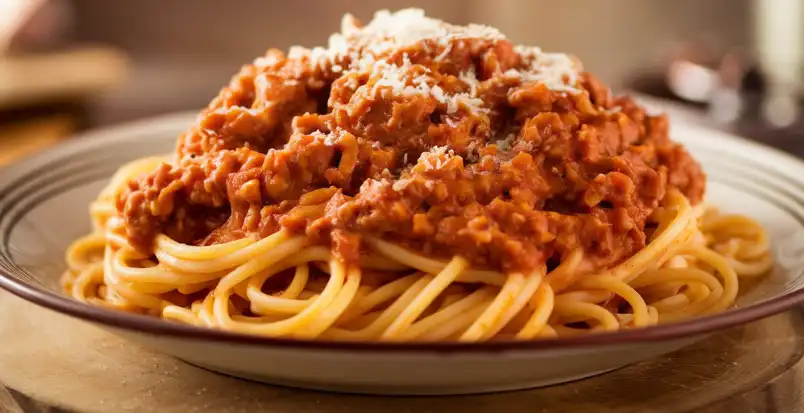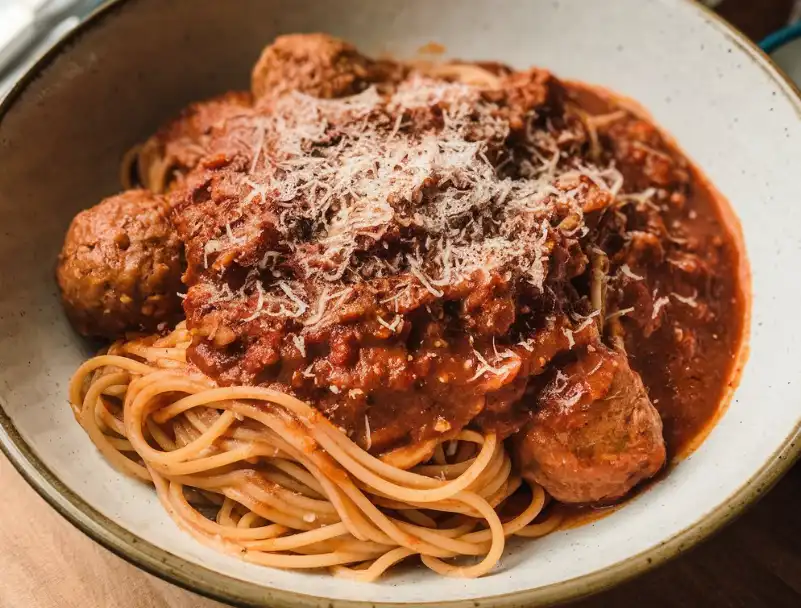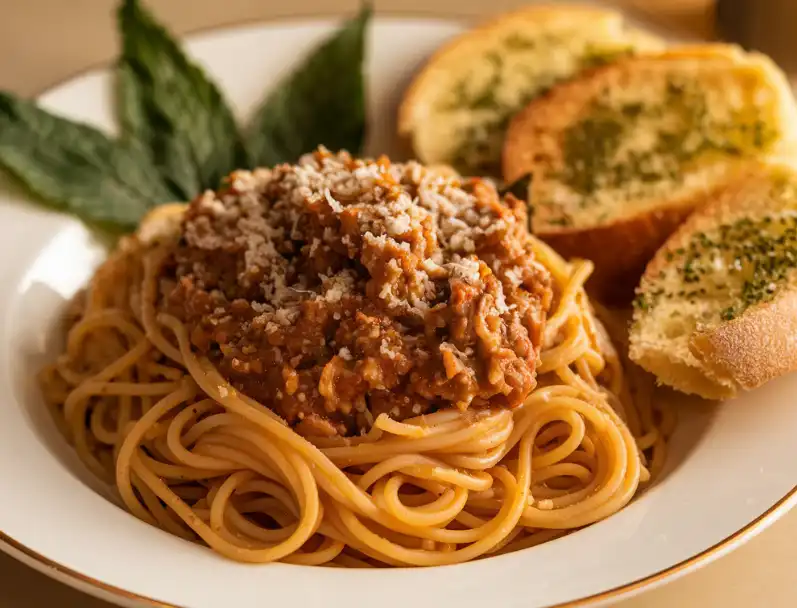Spaghetti Bolognese is a globally cherished dish that comforts dining tables with its hearty flavors and rich history. From its Italian roots to modern adaptations, this classic meal continues to captivate taste buds worldwide. Whether you’re an experienced cook or a beginner, crafting the perfect Spaghetti Bolognese is both an art and a science.

Table of contents
What is Spaghetti Bolognese?
Historical Background
Originating in Bologna, Italy, Bolognese sauce (or “ragù alla Bolognese”) has been a cornerstone of Italian cuisine for centuries. Traditionally, it pairs with tagliatelle, but its adaptation with spaghetti has become popular internationally. This evolution has turned the dish into a global symbol of Italian comfort food.
Global Popularity
In the U.S., Spaghetti Bolognese often incorporates tomato sauce and herbs, while other countries may add unique twists. Its versatility and universal appeal make it a beloved family meal and a restaurant staple.
What Goes in Spaghetti Bolognese?
Crafting an exceptional Bolognese sauce begins with using high-quality ingredients and carefully balancing flavors. By focusing on these elements, you can ensure a rich and satisfying sauce that elevates your pasta dish.
Classic Ingredients
Here’s a table summarizing the traditional elements:
| Ingredient | Purpose |
|---|---|
| Ground beef | Adds rich, savory flavor |
| Carrots and celery | Provides sweetness and texture |
| Onion | Enhances the sauce’s aromatic profile |
| Tomato paste | Deepens the tomato flavor |
| Red wine | Infuses complexity into the sauce |
| Spaghetti | Serves as the perfect base |
Modern Ingredient Variations
While traditional recipes stick to basics, modern versions often introduce innovative twists:
- Vegetarian Substitutes: Lentils or mushrooms can replace beef.
- Whole Grain Pasta: A healthier alternative that still complements the sauce’s flavors. Learn more about its benefits here.
Secret Ingredients for Extra Flavor
To elevate your Bolognese sauce, consider these additions:
- Nutmeg: Adds subtle warmth.
- Parmesan rind: Infuses depth during the slow cooking process.
- Milk or cream: Balances acidity for a smoother texture.
How to Make Bolognese Sauce

Creating a mouthwatering Bolognese sauce involves precision and patience.
Step-by-Step Instructions
- Prepare the Base: Sauté finely chopped onions, carrots, and celery in olive oil until softened.
- Brown the Beef: Add ground beef and cook until evenly browned, breaking up clumps.
- Incorporate Tomato Paste: Stir in tomato paste and cook briefly to enhance its flavor.
- Deglaze with Wine: Pour in red wine, scraping up browned bits from the pan. Let it simmer until reduced.
- Add Tomatoes and Simmer: Combine crushed tomatoes, herbs, and stock. Let the sauce simmer for 1-2 hours, stirring occasionally.
The Role of Slow Cooking
Slow cooking allows the flavors to meld, creating a sauce that’s rich and hearty. A minimum of one hour is recommended, but longer cooking times yield even better results.
Difference Between Bolognese and Meat Sauce
Bolognese sauce and meat sauce are often used interchangeably, but key differences set them apart:
| Aspect | Bolognese Sauce | Meat Sauce |
|---|---|---|
| Meat Proportion | Meat dominates the sauce | Balanced with more tomatoes |
| Cooking Method | Simmered for hours | Shorter cooking time |
| Ingredients | Includes milk or cream | Primarily tomato-based |
Understanding these distinctions ensures you’re preparing a truly authentic Bolognese.
The Proper Way to Serve Spaghetti Bolognese
Tossing Sauce with Spaghetti
For a cohesive dining experience, toss the cooked spaghetti with the sauce before serving. This technique ensures every strand is evenly coated, enhancing flavor with each bite.
Alternative Serving Methods
Some people like to ladle the sauce directly over plain spaghetti for a rustic and traditional presentation. On the other hand, you could try spaghetti pizza, a fun fusion of pasta and pizza flavors that offers a creative twist. Explore this idea here.
What to Serve with Spaghetti Bolognese
To truly enhance your Spaghetti Bolognese, pairing it with the right sides and drinks can transform the dish into a complete and gourmet dining experience. With that in mind, here are a few delightful options to perfectly complement your meal.
Side Dishes
Garlic Bread
Without a doubt, garlic bread is a classic side dish that pairs perfectly with Spaghetti Bolognese. The buttery and garlicky notes enhance the savory richness of the sauce, making each bite truly unforgettable.
Salads
Light, refreshing salads balance the heartiness of the main dish:
- Caesar Salad: Crisp romaine lettuce, Parmesan shavings, and crunchy croutons tossed in a creamy dressing.
- Mixed Greens: A vibrant mix of leafy greens, cherry tomatoes, and a tangy balsamic vinaigrette for a fresh contrast.
Roasted Vegetables
For a healthier and more flavorful side, you might consider oven-roasted vegetables such as zucchini, bell peppers, or asparagus. Not only do their caramelized edges add a touch of sweetness, but their tender insides also provide a delightful earthy contrast to the richness of the main dish.
Tips for the Best Spaghetti Bolognese

Perfecting Spaghetti Bolognese involves not only following the recipe but also incorporating professional tips.
Cooking Techniques
Sauté Vegetables Properly
To begin with, take your time with the soffritto, which consists of onions, carrots, and celery. By cooking them slowly, their natural sweetness has time to develop, infusing the sauce with a deeper and more balanced flavor.
Season Gradually
It’s crucial to season the sauce at every stage of the cooking process—starting with the vegetables, continuing after adding the beef, and finishing towards the end. This step-by-step layering of flavors not only enhances complexity but also ensures a well-rounded taste in the final dish.
Essential Tools for Preparation
Having the right tools on hand is essential, as they can truly make all the difference in simplifying the cooking process and achieving exceptional results. For example, using items like a heavy-bottomed pot for even heat distribution, a wooden spoon for gentle stirring, and a fine grater for freshly grated Parmesan ensures both precision and ease when crafting the perfect Spaghetti Bolognese.
| Tool | Purpose |
|---|---|
| Heavy-bottomed pot | Even heat distribution for simmering |
| Wooden spoon | Ideal for stirring without scratching |
| Fine grater | For freshly grating Parmesan cheese |
For an exciting alternative to classic pasta dishes, you might consider trying Haitian spaghetti, a flavorful option that incorporates unique seasonings into the traditional pasta base. To explore this bold and vibrant twist, learn more here.
Storage and Leftovers
Proper storage ensures that your Spaghetti Bolognese stays fresh and delicious for later enjoyment.
How to Store Properly
- Refrigeration: Transfer the cooled sauce into an airtight container and store for up to 4 days.
- Freezing: Portion the sauce into freezer-safe bags or containers and freeze for up to 3 months.
Best Practices for Reheating
When reheating Spaghetti Bolognese, the stovetop is your best option. Simply warm it over medium heat, adding a splash of water or stock to restore the sauce’s consistency and prevent it from drying out. On the other hand, avoid microwaving spaghetti mixed with sauce, as this method can cause the pasta to dry and lose its texture.
For a flavorful twist on your usual pasta dishes, you could try Mexican spaghetti, which infuses traditional pasta with a bold and spicy kick. To spice up your dinner routine, discover the recipe here.
Variations and Inspirations
If you’re feeling adventurous, there are several creative twists on traditional Spaghetti Bolognese to try. Each variation adds its own flair while preserving the essence of the classic dish.
Haitian Spaghetti
To start, if you’re looking for a bold and flavorful twist on the original, Haitian spaghetti is an excellent choice. Not only does this version incorporate sausages and bell peppers, but it also adds a unique blend of spices that creates a vibrant and satisfying meal. Furthermore, its distinct seasoning sets it apart, making it a must-try for anyone looking to explore new flavors. For more details, you can explore the recipe here.
Mexican Spaghetti
On the other hand, for those who enjoy a bit of spice, Mexican spaghetti is the perfect choice to add some zest to your meal. Featuring ingredients like chili powder, jalapeños, and other Southwestern flavors, this variation offers a zesty kick that livens up any pasta night. Moreover, it’s a fun and exciting way to put a unique spin on a classic dish. Be sure to check out the full recipe here.
Whole Grain Pasta
Finally, if you’re searching for a healthier alternative, swapping traditional spaghetti with whole-grain pasta is an excellent option. Not only is it packed with fiber and nutrients, but it also pairs beautifully with the hearty and savory Bolognese sauce, offering both flavor and health benefits. Additionally, this option is ideal for those who want to enjoy their favorite dishes with a nutritious twist. Learn more about the benefits of whole-grain pasta here.
FAQs About Spaghetti Bolognese
Bolognese sauce is a rich, meat-based sauce with a creamy texture, while spaghetti sauce is typically tomato-heavy with less meat. The slow-cooked Bolognese pairs beautifully with pasta like spaghetti or tagliatelle.
Spaghetti Bolognese is not traditional in Italy; instead, Bolognese sauce (ragù alla Bolognese) is served with tagliatelle or other flat pasta. However, the dish has gained global popularity as an Italian-inspired favorite.
Adding a splash of red wine, a Parmesan rind, or a pinch of nutmeg can enhance the depth of Bolognese sauce. Slow cooking the sauce also brings out its rich and savory flavors.
Yes, finely chopped carrots are a traditional ingredient in authentic Bolognese sauce. They not only add natural sweetness but also help balance the acidity of the tomatoes, enhancing the sauce’s overall flavor.
Yes, milk or cream is, without question, a traditional addition to Bolognese sauce. In addition to softening the tomato’s acidity, it also enhances the overall texture, creating a rich and velvety finish that makes the sauce truly stand out.
While spaghetti is widely used, traditional Italian Bolognese is best served with tagliatelle. The flat surface of the tagliatelle holds the sauce better, creating a more cohesive dish.
Italian Bolognese is meat-focused and includes milk, while the American version typically has more tomato sauce and skips the milk. Both are delicious but differ in texture and richness.
Conclusion: Mastering Spaghetti Bolognese
Spaghetti Bolognese is more than just a meal—it’s a celebration of flavors, tradition, and creativity. By combining high-quality ingredients with careful techniques, you can create a dish that warms the heart and pleases the palate.
Final Tips for Success
- Taste as You Cook: Adjust the seasoning at every stage to achieve a perfectly balanced flavor.
- Be Patient: Allow the sauce to simmer for as long as possible to deepen its richness.
- Customize It: Add your twist with unique ingredients or alternative pasta types to suit your preferences.
If you’re looking for more meal inspiration, don’t miss my guide on 5 Main Dishes—packed with ideas to make your next meal unforgettable!
